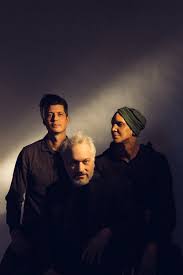Album Review: Marc Ribot’s Ceramic Dog – Hope
This is the third album for the three piece Marc Ribot’s Ceramic Dog which is Ribot, plus two members of the Secret Chiefs 3 avant-rock band. The band has Shahzad Ismaily, on bass and synth and Ches Smith on drum, percussion and electronics. To enjoy their work it probably helps if you tastes run to Captain Beefheart, Pere Ubu and James Chance.
Marc Ribot first came to my attention for his work with Tom Waits on 1985’s Rain Dogs. Since then he has worked extensively as a collaborator with many others including Elvis Costello, Marianne Faithful and The Black Keys. In addition to playing on over thirty  albums with John Zorn who Rolling Stone called “one of the most influential musicians of our time” Ribot has also put out over twenty five albums of his own. His own output in various covers many genres including Cuban, No Wave, Jazz and Rock. As well as being hard working and in demand he is one of the most difficult musicians to categorise, the only constant is that he plays guitar.
albums with John Zorn who Rolling Stone called “one of the most influential musicians of our time” Ribot has also put out over twenty five albums of his own. His own output in various covers many genres including Cuban, No Wave, Jazz and Rock. As well as being hard working and in demand he is one of the most difficult musicians to categorise, the only constant is that he plays guitar.
This album Hope was created during lockdown sessions with the trio working in the same New York studio space but separately. From the sessions there was a six track limited issue EP/mini LP What I Didn’t Do On My Long “Vacation” which was released late last year. That EP is worth listening to in conjunction with this album as the musical and lyrical themes are linked.
On Hope’s opening track B Flat Ontology Ribot’s slow drawling voice lists groups of people such poets or novelists that are “just amazing, just amazing” over guitar reverb and squalls of chords. Smith provides some slow delicate percussion work and it is all underpinned by Simalii’s picked bass notes.
The next track, Nickelodeon, starts with scratchy guitar and drum rolls before setting off on a reggae beat with distorted vocals start and a chorus call of “exodus.” And this is followed by Wanna which has bursts of post punk guitar and drums driving the song forward. The distorted vocal “I wanna” is hissed as increasingly jagged guitar riffs wail over the drum beat.
The Activist reminds me of Gil Scott Heron. Ribot rants against society and capitalism, but mostly against ineffective activists, even though he clearly sympathizes with their opposition. His words such as “I refuse” and “I resist” are accentuated by the tapping of drums and discordant electronic noises. Ribot seems to be hardly pausing for breath as the noise builds to a siren and a cacophony. The vocals end not with a complaint but with “let’s do the twist.”
The first instrumental is Bertha The Cool which has a laid back summery jazz vide. The bubbling bass guitar and snare drum create a groove over which a trumpet picks out notes. There are cymbals crashing, guitar and bass moving together, electronic noises and at times it all drops down to just a clapped rhythm.
They Met In The Middle is story about two people “Guy from the east, guy from the west” which is told at breakneck speed. The bass echoes to emphasize some key words, the drums roll in a different pattern each time and there are squalls of guitar over the top. Finally the words end with some gentle strummed guitar chords.
The Long Goodbye is a ten minute meandering instrumental track that starts tentatively and jazzy. It gets noisier as the guitar volume and attack grows and the drums join in. As you start wondering where this will go next the drums reach a crescendo and the guitar blasts riffs. Eventually the track collapses into a discordant patter from the drums, notes from the piano and blasts from the trumpet. A final flourish of slow tense guitar chords and the rattle of cymbals makes you think it is about to take off again, but it doesn’t it is just leading to the end.
This followed by another long instrumental. At first Maple Leaf Rage is a very quiet piece with the occasional bass guitar note answered by the rustling of the drums. A guitar joins in with higher and brighter notes and the drum pattern changes. After five minutes the tone changes dramatically. There are a few seconds of silence and then slabs of guitar noise, feedback and a trumpet like sound. This is followed by the slow pulse of rattled cymbals that create an unsettled feeling. There are more bursts of drums, guitar riffs and a bass pulse before the piece fades out in an echoing flutter of drums.
The final track is the slow meditative Wear Your Love like Heaven. Ribot speaks the lyrics, and occasionally plays a chord or note with reverb on his guitar. There are constant bass notes and lightly tapped jazz drum and cymbal shuffles. Ribot sounds reflective and it is a sad, downbeat ending to the album.
The album brings together a variety of pieces that have distinctly jazzy leanings as well as a punk aesthetic. There is lots of Ribot’s distinctive spiky guitar playing that keeps you on edge. Ismaily adds bass notes or phrases that keep tracks moving forwards. Smith’s drumming is as rocky or as jazzy as a track needs. This is not an easy listen, but it’s a rewarding one.
John Bradbury
Click here for more Marc Ribot’s Ceramic Dog